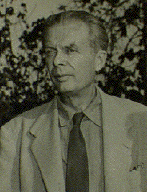 ALDOUS HUXLEY (1894-1963)
ALDOUS HUXLEY (1894-1963) ALDOUS HUXLEY (1894-1963)
ALDOUS HUXLEY (1894-1963)"But I like the inconveniences."
"We don't," said the Controller. "We prefer to do things comfortably."
"But I don't want comfort. I want God, I want poetry, I want real danger, I want freedom, I want goodness. I want sin."
"In fact," said Mustapha Mond, "you're claiming the right to be unhappy."
"All right then," said the Savage defiantly, "I'm claiming the right to be unhappy."
"Not to mention the right to grow old and ugly and impotent; the right to have syphillis and cancer; the right to have too little to eat; the right to be lousy; the right to live in constant apprehension of what may happen tomorrow; the right to catch typhoid; the right to be tortured by unspeakable pains of every kind." There was a long silence.
"I claim them all," said the Savage at last.
Mustapha Mond shrugged his shoulders. "You're welcome," he said.
--from Brave New World
The English novelist and essayist Aldous Leonard Huxley, b. July 26, 1894, d. Nov. 22, 1963, a member of a distinguished scientific and literary family, intended to study medicine, but was prevented by an eye ailment that almost blinded him at the age of 16. He then turned to literature, publishing two volumes of poetry while still a student at Oxford. His reputation was firmly established by his first novel, Crome Yellow (1921), a witty satire on the intellectual pretensions of his time.Huxley's early comic novels, which include Antic Hay (1923), Those Barren Leaves (1925), and Point Counter Point (1928), demonstrate his ability to dramatize intellectual debate in fiction; he discussed philosophical and social topics in a volume of essays, Proper Studies (1927). In both fiction and nonfiction Huxley became increasingly critical of Western civilization in the 1930s. Brave New World (1932), his most celebrated work, is a bitterly satiric account of an inhumane society controlled by technology, in which art and religion have been abolished and human beings reproduce by artificial fertilization. Huxley's distress at what he regarded as the spiritual bankruptcy of the modern world led him toward mysticism and the use of hallucinatory drugs. The novel Eyeless in Gaza (1936) portrays its central character's conversion from selfish isolation to transcendental mysticism; and in The Doors of Perception (1954) and Heaven and Hell (1956) he describes the use of mescaline to induce visionary states of mind.
Huxley, who moved to southern California in 1947, was primarily a moral philosopher who used fiction during his early career as a vehicle for ideas; in his later writing, which consists largely of essays, he adopts an overtly didactic tone. Like his contemporaries D. H. Lawrence and George Orwell, Huxley abhorred conformity and denounced the orthodox attitudes of his time. The enormous range of his intellect and the pungency of his writing make him one of the most significant voices of the early 20th century.
Bibliography: Atkins, John, Aldous Huxley: A Literary Study (1967); Bedford, Sybille, Aldous Huxley (1985); Birnbaum, Milton, Aldous Huxley's Quest for Values (1971); Bowering, Peter, Aldous Huxley: A Study of the Major Novels (1968); Dunaway, David King, Huxley in Hollywood (1989); Ferns, C.S., Aldous Huxley (1980); Firchow, Peter, Aldous Huxley: Satirist and Novelist (1972) and The End of Utopia (1984); Kuehn, Robert, ed., Aldous Huxley: A Collection of Critical Essays (1974); May, Keith M., Aldous Huxley (1972); Watts, Harold H., Aldous Huxley (1969); Wyatt, Donald, Aldous Huxley (1985).
Text Copyright © 1993 Grolier Incorporated